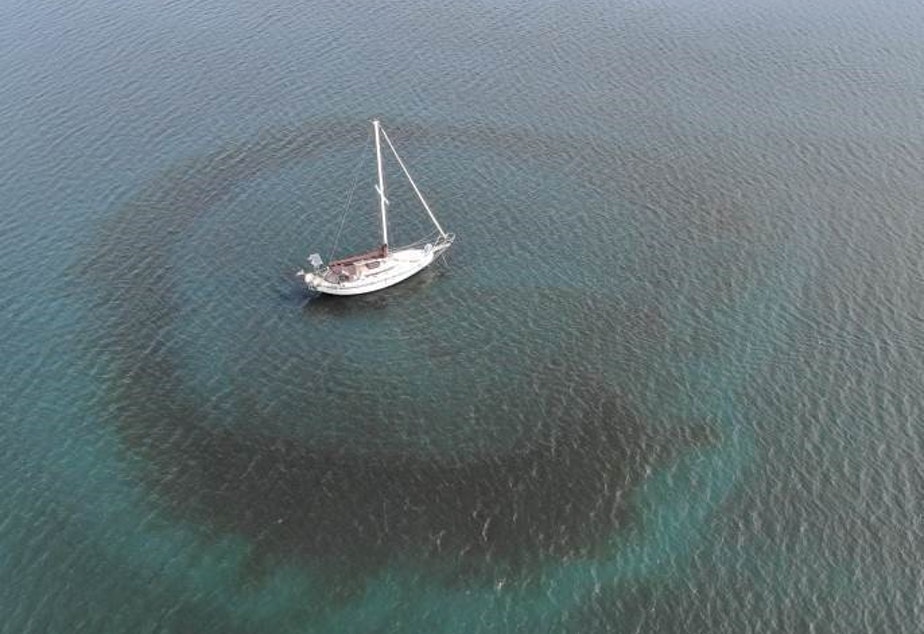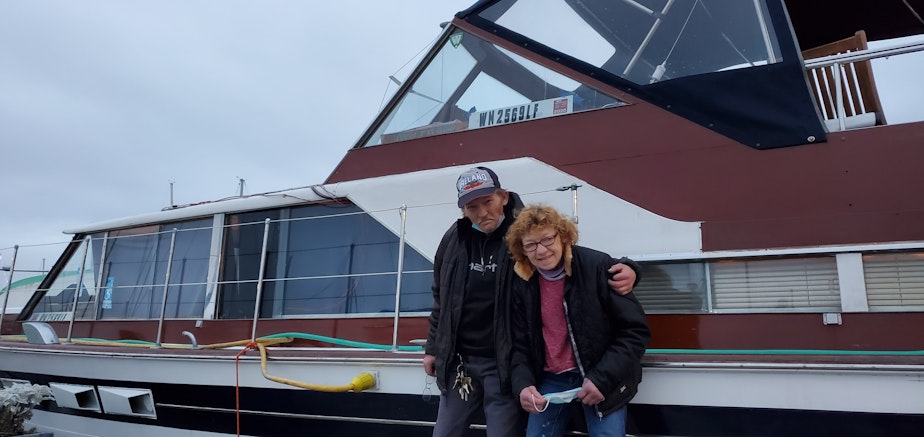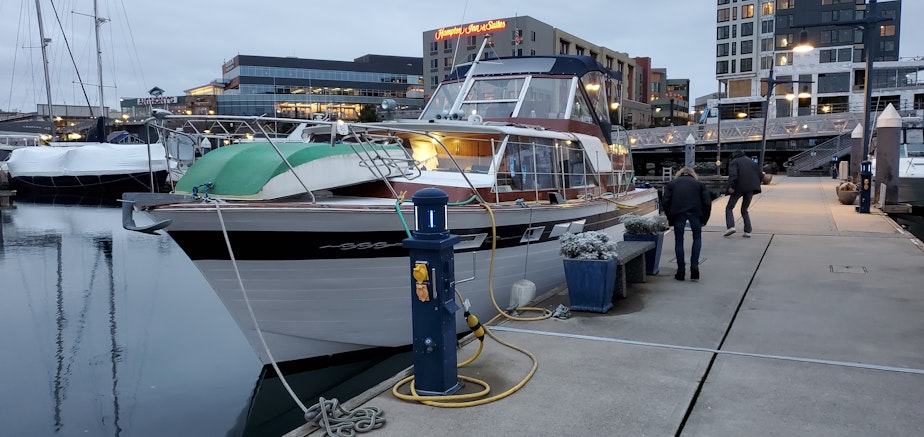'The Wild West on the water.' Finding makeshift housing on Puget Sound

It isn't hard to notice a derelict boat — their bilges are dirty, their engines are smoking, or their mast may be missing. But when searching for shelter, older and dingier boats like these can be a lifeline for many.
Becky and Ian Thompson love their boat. And despite being built in 1965, this mahogany vessel is holding up well. It's been retrofitted with modern amenities, including a deck with chairs for leisure, an in-unit washer and dryer, and a kitchen.
But before finding their boat, the Thompsons spent their life on the mainland, at one time living homeless in Fremont before cycling through a number of tents and vans. The boat has been a major improvement; they have access to electricity, bathrooms, and feel comfortably private in their vessel.
The Thompsons are part of a sizable community of boaters living in marinas across Puget Sound. Though, they don't have what's called "liveaboard" status — an official designation from marinas where boaters can lease out slips for long-term residency. The qualifications for liveaboard status vary from port to port, but requirements generally call for rigorous annual inspections, an established long-term relationship with the port, and critically, hundreds of thousands of dollars in liability insurance.


Sponsored
Insurance is where the Thompsons have struggled to find a way in. Instead, the two of them end up paying for guest moorage, which can run for a couple hundred dollars a week. The other catch is that guest mooring is in high demand, and the maximum most marinas will let guests moor is just one week.
It's not that they haven't tried to get insurance — it's been their main focus for much of the last year.
"We spent ... almost a couple months trying to get insurance of some sort," Ian Thompson said. "Progressive sent us a declaration of acceptance, and at the same time, in the very same day, they sent us a cancellation."
Insurance is critical for their boat, especially amidst winter storms. They've already experienced some light damage to their boat, and it can be difficult for the two of them to manage repairs. Both Ian and Becky are retired, in their 60s, and navigate a series of physical disabilities.
After reaching out to nearly every insurance provider in the region, the Thompsons finally figured out the cause of the rejections: they have a wood hull boat. The Thompsons' situation collides with a larger problem on Washington's waterways: an increase in run-down and abandoned derelict vessels in the region.
Sponsored
The derelict problem
Derelict vessels — also known as ghost boats — tend to be older, possibly abandoned, and can pose a serious risk to new boaters and the environment. Because they're often at risk of sinking and haven't been regularly maintained, issues like oil leaks can harm aquatic life, while a sinking boat can cost thousands of dollars to dredge up.
"I look at a whole laundry list of issues," said Carol Tripp, the accountant, treasurer, and executive director at the Port of Poulsbo. "And I hate to look at that and say, 'I'm sorry, I can't let you in because of the condition of your boat,' which is a huge disadvantage. It's hard for me to ... do that, but it's part of my job."
If an owner for a vessel can't be found, or the owner doesn't have insurance, those costs fall on marinas. Tripp's most infamous example concerns a boat that made its way to Poulsbo after being purchased for just $1 on Craigslist, and ended up costing the port around $10,000 in cleanup expenses.
The Thompsons' boat is by no means derelict, and it was purchased for more than a single dollar online. But wood hull boats, no matter how well maintained, pose a more serious risk of sinking than recently built fiberglass boats, and that's why insurance companies are hesitant to cover them. And without insurance, older and more affordable boats can't stay long term at marinas.
Sponsored
"Many people really do want to try to fix [a boat] up," said Tripp. "They have a small amount of money and they're really at a disadvantage because marinas are so, so very shy of allowing somebody with a boat that is really not up to par."
When a problem with a derelict vessel does occur, it's up to a derelict vessel program of the Department of Natural Resources to clean things up. Currently, the program is tracking around 300 vessels across Washington state.
Troy Wood, the program's manager, says we're in the middle of a huge derelict bubble right now — one that he says reaches back to 2018.
"A lot of people didn't get out to their vessels to take care of them," Wood said, referencing a pandemic slowdown. "But also, where there's a lack of on-water enforcement for registration and anchorage, and where there's close access to the water for social services, things like busses and ferries — we tend to find a large increase of vessels on water."
The derelict vessel program operates with just three people and a $2.5 million budget, which allows them to remove around 90 to 120 vessels a year (and there's currently a bill in the Washington State Senate that would expand that budget). But a large part of their job is education. As the program runs into new boat owners, they inform them of where they can stay on the water and what kind of repairs their boat needs to get out of dereliction.
Sponsored
Insurance is a problem here, too. It's through insurance that both marinas and boat owners can access Wood's services, including the vessel turn-in program (which is the proper way to dispose of a boat in Washington).
In the case that a derelict boat has someone living on it, Wood said that they work with regional social services to find a way for the boat to either improve its condition, or for its owner to find shelter.
"It's unfortunate when we run into situations like that," Wood said. "But in the rare circumstances where a vessel owner refuses to get off of the vessel, we really try our very best to work with them and get them into a safe situation."
Is there a solution?
There are two tandem problems here. Derelict boats are on the rise, burdening ports and the state with cleanup costs. And because of the risk to safety, the environment, and their finances, ports and insurance agencies are hesitant to support derelict and, by partial association, low-income boaters.
Sponsored
So what about a solution? A listener reached out to pitch an idea for a dual-purpose safe lot. This would be a dedicated marina space where moorage is adjusted for low-income boaters, and where officials can keep a closer eye on derelict vessels. Two birds with one buoy.
"You nailed it right there," Ian Thompson said. "We're in the low-income ... and there's got to be low-income moorage."
Carol Tripp, from the Port of Poulsbo, was more hesitant.
"Initially your thought is, 'Oh, that's great.' But I also know from our experience here in our particular little area that law enforcement is stretched so thin that they're having a hard time even monitoring the vessels that are out in the bay," Tripp said. "I don't know logistically how it would come to fruition."
Tripp also shared a concern that a lot of derelict boats could quickly become a kind of derelict graveyard, posing a serious hazard to waterways.
Troy Wood, from the derelict vessel program, echoed Tripp's sentiments.
"If you have an anchorage area like that, you would really want someone to maintain eyes on it. Because derelict vessels could sink in a matter of minutes."
Wood also noted that getting all our regional ports to buy into a kind of safe lot idea would be a very high logistical hurdle.
"Getting other jurisdictions to do that? It's hard," Wood said. "It's hard to get on-water enforcement right now because there's a shortage of police, and there's not a whole lot of interest right now of having police out there enforcing registration. So it's really the Wild West on the water."
For the time being, the situation is what it is. Insurance is hard to get, especially for older vessels. Moorage is competitive across the Sound. Ghost boats continue to cluster and cause damage throughout our waterways. And though it feels like there should be a solution, those in charge say there aren't enough resources or staff to corral a larger regional response.
In the meantime, Becky and Ian Thomspon will continue to do what they always have: Prepare for the worst and hope for the best.
"It boils down to how safe can you get? We can only be so safe down here."




